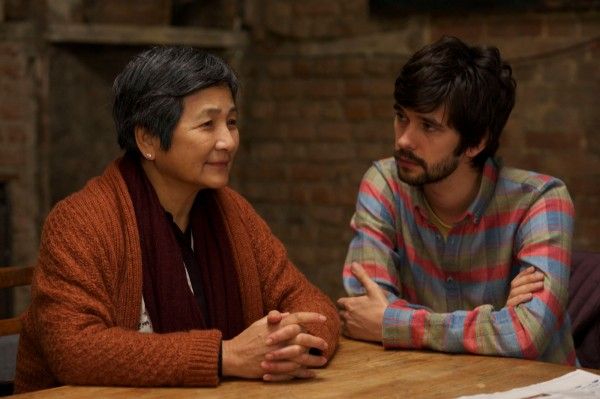Hong Khaou’s Lilting examines artificial barriers, but does so in an artificial way. Human connection can obviously transcend ethnicity and sexual orientation, but Khaou belabors the point, and while the small scale does provide a sense of intimacy to the story, the film constantly feels overwrought. It’s a frustrating picture because there’s sweetness to the story, and it helps bring a little sunlight into the dingy world of grief and sad flashbacks. To his credit, Khaou tries to let his actors have the room to carry the picture, but even at their best, they keep falling into an emotional rut where what’s supposed to be soft and lyrical is flat and listless.
Junn (Pei-Pei Cheng) is stuck in a nursing home, and grieving over the recent death of her son, Kai (Andrew Leung), although her spirits are somewhat buoyed by a harmless romance with fellow resident, Alan (Peter Bowles). She was also unaware that Kai was gay, and his boyfriend Richard (Ben Whishaw) feels obligated to look after her even though she thinks he was only Kai’s platonic friend as well as the reason she couldn’t come live with her son. In an attempt to make Junn’s life better, Richard hires an interpreter who can help Jun and Alan come closer. However, he and Junn still continue to struggle with Kai’s death and how they can share their grief when they’re separated by language and secrecy.
Acceptance is an important value, but Khaou doesn’t make it feel particularly worthwhile, although to his credit, he does depict it in different forms. It’s not just Junn and Richard having to accept the loss of a loved one. It’s also the fear that Junn won’t accept the fact that her son was gay, or that Alan and Junn can’t accept each other unless there’s a language barrier between them. But all of it feels insubstantial because Khaou never takes his exploration anywhere unexpected. We know Kai’s homosexuality will eventually be revealed, and so it just has to limply hang over every scene with Richard on the verge of tears and Junn looking confused as to why Kai’s friend would be so utterly devastated.
It’s a relief when the film’s nice sentiment actually gives way to nice scenes. After enduring depressing flashbacks with Kai, we’re given a welcome respite as Alan and Junn now have the ability to communicate with the help of a translator, and both of them are at a bit of a loss of what to say. However, the reliance on the translator in all of the conversations with Junn keep bringing the film to a halt, especially since she isn’t on even footing. Both Alan and Richard can stop the translator with “Don’t say that”, but Junn never does. While it’s a solid parallel to Kai not telling his mother about his homosexuality, it also renders her a lesser person. She gets the conversation they choose, not vice versa.
Cheng’s performance doesn’t help matters since her rigid performance doesn’t seem to connect to any of her fellow actors. Her interactions with Kai have about as much investment as her interactions with Richard. I’m all for restraint when it comes to acting, but Junn is almost a wall, and Cheng’s decision to play the character as aloof and upset creates a one-sided dialogue where her co-stars, especially Whishaw, can shine, but they can’t carry the scene alone. In a movie about breaking down barriers, Cheng never seems to let hers down past a slight smile.
Somewhere beneath its mostly dry direction and stilted celebration about accepting others, there is a movie that has the warmth its characters are trying to embrace. There are wonderful, quiet, human moments like Richard telling a confused Junn, “I want to make sure you’re living okay here without Kai.” It’s a very simple statement, but it inhabits a warm connection of trying to do a kindness and moral obligation that probably won’t be appreciated. Unfortunately, Lilting mostly meanders around values we already understand, and unfortunately misses the emotions instilled by those values. Acceptance is ultimately about connection, and Lilting doesn’t make one.
Rating: C-
Click here for all of our Sundance 2014 coverage. Click on the corresponding links for my other Sundance 2014 reviews:


